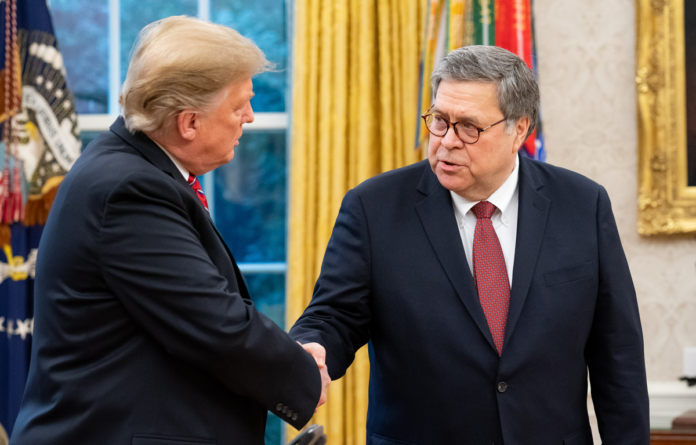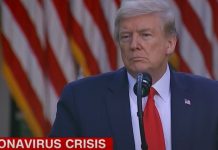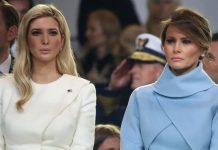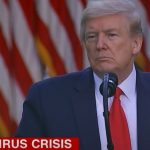Former Special Counsel to the General Counsel of the Department of Defense (2015-16) and professor of law, Ryan Goodman, has released a report based on “extensive research” that shows history repeating itself.
This week, as we await Attorney General Barr’s redacted Mueller report, Goodman reveals how Barr has done this all before. Judging by the similarities, we can make a reasonable prediction that Barr’s redacted report may leave out and obfuscate the full meaning of the Mueller report.
Fascinating read from @rgoodlaw … A 1989 Barr memo "concluded that the FBI could forcibly abduct people in other countries without the consent of the foreign state." Barr refused to provide the full memo to Congress, instead saying he'd "summarize the principal conclusions.” https://t.co/WphU1tGv2Z
— Natasha Bertrand (@NatashaBertrand) April 15, 2019
In 1989, William Barr was head of the Justice Department’s Office of Legal Counsel (OLC) under President H.W. Bush. As Goodman notes, it was Friday the 13th, the same day as the “Black Friday” market crash. Reports came in that Barr had written a legal memo that came to a shocking conclusion:
The secretive memo concluded that “the FBI could forcibly abduct people in other countries without the consent of the foreign state.”
Goodman notes how perfectly Barr’s response then coincides with what he’s doing today. Legal scholars then, as today, found what he did “particularly egregious.”
“Members of Congress asked to see the full legal opinion. Barr refused, but said he would provide an account that ‘summarizes the principal conclusions.’ Sound familiar?
“In March 2019, when Attorney General Barr was handed Robert Mueller’s final report, he wrote that he would ‘summarize the principal conclusions’ of the special counsel’s report for the public,” wrote Goodman.
Congress was forced to issue a subpoena to see the full memo, which delayed getting to read the contents long after Barr left office.
When the full memo was finally seen, Goodman states that the summary omitted: “some of the most consequential and incendiary conclusions from the actual opinion. And there was evidently no justifiable reason for having withheld those parts from Congress or the public.”
When President Bush was questioned by reporters about the memo, he explained he was “embarrassed” not to know what it was about. Secretary of State James Baker had to walk it back with a statement that proved to be false. Then the Attorney General’s office refused to provide a copy to Congress.
A month later, Barr testified before Congress, where he said his memo was confidential. He pointed out that he was willing to submit a 13-page summary of “the principal conclusions.” He wanted Congress and the public to trust his summary but later, that trust appears to have been violated over one and a half years later. Congress finally issued a subpoena for the memo and it was made public in 1993.
Goodman goes on to outline what Barr omitted and the omissions couldn’t be more problematic. The opinion omitted that Barr had:
“…asserted that the President could violate the United Nations Charter because such actions are ‘fundamentally political questions.'”
However, the opinion ignored President Bush’s constitutional duties.
“The 1989 opinion ignored the President’s constitutional duty to ‘take care’ that US laws, including ratified treaties, be faithfully executed. And the opinion conflated the so-called political question doctrine, which is about whether courts can review an executive branch action, with the question whether an executive branch action is authorized or legal.”
In another omission, Barr reversed a method for interpreting statutes that “Congress should be presumed to authorize only actions that are consistent with U.S. obligations under international law.” Rather than favoring international law, Barr declared that if there is no explicit restriction concerning international law, “the congressional statute should be read to authorize the executive branch to violate international law.”
The third omission seems to have conveniently left out that Barr’s opinion discussed international law. Barr’s opinion did touch on international law, though written and oral testimony said it did not.
The 1989 opinion was based on the “logic” of violating international law based on sovereignty.
“…because sovereignty over territory derives not from the possession of legal title, but from the reality of effective control, logic would suggest there would be no violation of international law in exercising law enforcement activity in foreign territory over which no state exercises effective control.'”
“The fact that the opinion had to resort to such a claim of ‘logic,’ rather than jurisprudence or the practice and legal views of states, indicated its shallowness,” wrote Goodman.
Flash forward to today, and Barr’s testimony in front of Congress indicates he fully expects Congress to begin issuing their subpoenas to see the full Mueller report. It’s what happened years before, after all.
That’s something that House Judiciary Chairman Jerry Nadler has indicated he is willing to do and what we can expect as Barr’s color-coded redactions are seen this week. Does Barr expect this week to go much that same as in 1989? If it does, how much longer will the Mueller report remain hidden from public view?
Is delaying and obfuscating, in fact, the whole point of Barr’s approach?
US Attorney General William Barr promised color-coded redactions in the release of special counsel Robert Mueller's report. CNN's Jeanne Moos reports. https://t.co/gcQ6dqbIMH pic.twitter.com/Xw2L7PD9g2
— CNN International (@cnni) April 13, 2019
See more about Barr’s history of “burying investigations” to support President Bush during “Iraqgate” below:
From alleged cover-ups to presidential pardons, William Barr has a history of controversies. But one thing is consistent: the current AG seems to always align himself with the President he's serving. @randikayeCNN takes a look at Barr's career timeline. https://t.co/TmBpCcKk0v pic.twitter.com/RqZEr2QTO1
— CNN (@CNN) April 12, 2019
Featured image: Donald Trump and William Barr via Wikimedia Commons











